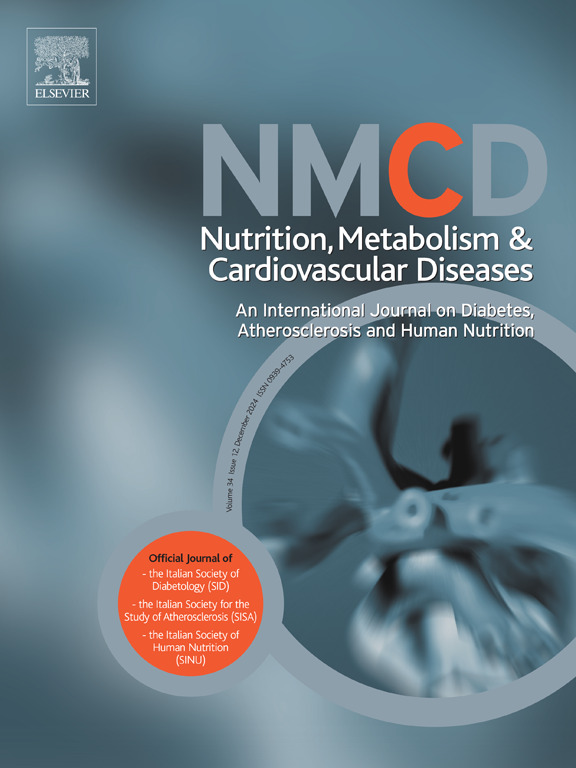Effect of Dietary Approaches to Stop Hypertension (DASH) diet on lipid profile in individuals with overweight/ obesity: A GRADE-assessed systematic review and meta-analysis of clinical trials
IF 3.7
3区 医学
Q2 CARDIAC & CARDIOVASCULAR SYSTEMS
Nutrition Metabolism and Cardiovascular Diseases
Pub Date : 2025-04-15
DOI:10.1016/j.numecd.2025.104057
引用次数: 0
Abstract
Background and aim
Obesity is a major nutritional disease that increases the risk of developing serious health conditions like dyslipidemia. Plant-based diets, like DASH (dietary approaches to stop hypertension), can help lower the risk of dyslipidemia. However, evidence on the effect of DASH diet on lipid profile in populations with overweight/obesity is inconsistent. This meta-analysis of controlled trials investigated the effects of the DASH diet on lipid profile in individuals with overweight/obesity.
Methods and results
A search for relevant studies was conducted in databases like PubMed, Web of Science, and Scopus until January 2024. The calculation of weighted-mean differences (WMDs) and 95 % confidence intervals (CIs) was performed based on the random-effects model. Sensitivity, meta-regression and publication bias analyses were also conducted. 22 eligible studies with 26 arms and 3562 participants were included. DASH diet significantly reduced total cholesterol (TC) (WMD: 5.05 mg/dl, 95 % CI: 8.78, −1.31, p = 0.008), low-density lipoprotein cholesterol (LDL-C) (WMD: 5.33 mg/dl, 95 % CI: 8.54, −2.11, p = 0.001) and very low-density lipoprotein cholesterol (VLDL-C) (WMD: 3.26, 95 % CI: 6.19, -0.34, p = 0.029) levels. Greater reductions were observed in studies with durations ≤8 weeks. All of the included studies were classified as high quality except two, which were classified as moderate quality. LDL-C and VLDL-C were categorized as high-grade evidence, while others were categorized as moderate.
Conclusions
DASH diet could improve the lipid profile of individuals with overweight/obesity by decreasing TC, LDL-C and VLDL-C levels. However, it doesn't have significant effects on high-density lipoprotein cholesterol and triglyceride levels.
饮食方法停止高血压(DASH)饮食对超重/肥胖个体脂质谱的影响:一项分级评估的临床试验系统评价和荟萃分析
背景和目的:肥胖是一种主要的营养疾病,会增加患血脂异常等严重健康状况的风险。植物性饮食,如DASH(停止高血压的饮食方法),可以帮助降低血脂异常的风险。然而,关于DASH饮食对超重/肥胖人群脂质谱影响的证据并不一致。这项对照试验的荟萃分析调查了DASH饮食对超重/肥胖个体脂质谱的影响。方法与结果:截至2024年1月,在PubMed、Web of Science、Scopus等数据库中检索相关研究。根据随机效应模型计算加权平均差(wmd)和95%置信区间(ci)。还进行了敏感性、meta回归和发表偏倚分析。纳入了22项符合条件的研究,共26个研究组和3562名受试者。DASH饮食显著降低了总胆固醇(TC) (WMD: 5.05 mg/dl, 95% CI: 8.78, -1.31, p = 0.008)、低密度脂蛋白胆固醇(LDL-C) (WMD: 5.33 mg/dl, 95% CI: 8.54, -2.11, p = 0.001)和极低密度脂蛋白胆固醇(VLDL-C) (WMD: 3.26, 95% CI: 6.19, -0.34, p = 0.029)水平。在持续时间≤8周的研究中观察到更大的降低。所有纳入的研究均被归类为高质量,只有两项研究被归类为中等质量。LDL-C和VLDL-C被归类为高级别证据,而其他证据被归类为中度证据。结论:DASH饮食可通过降低TC、LDL-C和VLDL-C水平改善超重/肥胖个体的脂质状况。然而,它对高密度脂蛋白胆固醇和甘油三酯水平没有显著影响。
本文章由计算机程序翻译,如有差异,请以英文原文为准。
求助全文
约1分钟内获得全文
求助全文
来源期刊
CiteScore
6.80
自引率
2.60%
发文量
332
审稿时长
57 days
期刊介绍:
Nutrition, Metabolism & Cardiovascular Diseases is a forum designed to focus on the powerful interplay between nutritional and metabolic alterations, and cardiovascular disorders. It aims to be a highly qualified tool to help refine strategies against the nutrition-related epidemics of metabolic and cardiovascular diseases. By presenting original clinical and experimental findings, it introduces readers and authors into a rapidly developing area of clinical and preventive medicine, including also vascular biology. Of particular concern are the origins, the mechanisms and the means to prevent and control diabetes, atherosclerosis, hypertension, and other nutrition-related diseases.

 求助内容:
求助内容: 应助结果提醒方式:
应助结果提醒方式:


